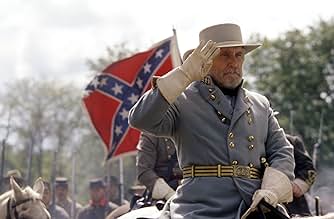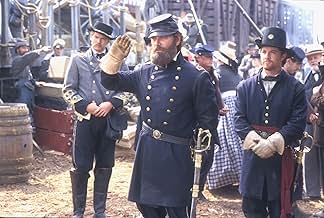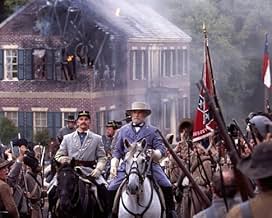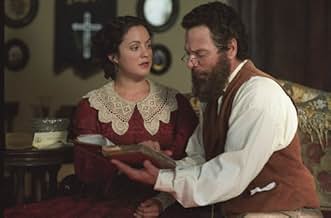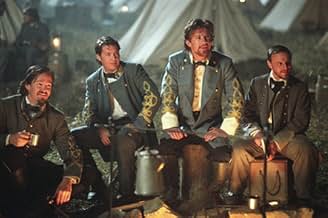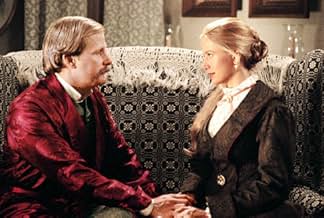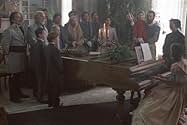Der Aufstieg und Fall des konföderierten Generals Thomas "Stonewall" Jackson, als er von 1861 bis 1863 mit militärischem Erfolg gegen die Union antritt, als er versehentlich von seinen eigen... Alles lesenDer Aufstieg und Fall des konföderierten Generals Thomas "Stonewall" Jackson, als er von 1861 bis 1863 mit militärischem Erfolg gegen die Union antritt, als er versehentlich von seinen eigenen Soldaten getötet wird.Der Aufstieg und Fall des konföderierten Generals Thomas "Stonewall" Jackson, als er von 1861 bis 1863 mit militärischem Erfolg gegen die Union antritt, als er versehentlich von seinen eigenen Soldaten getötet wird.
- Auszeichnungen
- 1 Gewinn & 4 Nominierungen insgesamt
- Gen. James Kemper
- (as Royce Applegate)
- Confederate General
- (as Robert C. Byrd)
Empfohlene Bewertungen
What's very impressive about this movie was (1) not overdone violence; (2) beautiful cinematography; (3) an unusual and refreshing reverence for God, the Bible and Christian thought and (4) a better portrayal by Robert Duvall of Robert E. Lee than Martin Sheen's version in "Gettsyburg." On the point 3, all it was - to those atheists/agnostics who were offended by Jackson's reverence - was showing an accurate portrayal of how people thought and believed back then in the south. That's simply the way it was and the way people viewed everyday life, though Biblical standards and language. So kudos, to the filmmakers here for at least giving us an accurate description of the times, even though they probably don't share those beliefs. Of course, the critics - almost all of them secular - hated the film.
One thing I did miss from "Gettysburg" was a bigger role from Jeff Daniels, who was so good as "Col.Chamberlain." His role here in that capacity is limited.
In summary, an accurate film with ideals and worthy of anyone's collection, particularly if they are Civil War buffs, but a movie that needed more punch to it to be more "watchable."
I remember reading about the Director's Cut on the old IMDb forums, they said the theater version left major important parts. Add those back in, and it clicks.
With the missing parts in, it's almost as good as Gettysburg, and Stephen Lang's "Sappy Stonewall" is much less irritating. In the theater we were counting the minutes until the next cry, and coughing to wake up the snoring history buffs all around us.
Ps I miss those forums. For things like this alone, they were gold.
`Gods and Generals,' which begins right after the firing on Fort Sumter and ends shortly before the Battle of Gettysburg, is the first part of a planned trilogy. Despite a handful of `name' players in the cast (Robert Duvall, Jeff Daniels, Mira Sorvino and even Ted Turner in a ludicrous cameo appearance), writer/director Ronald F. Maxwell is unable to bring a single character in his film to convincing life (with the possible exception of `Stonewall' Jackson, who gets to carry the burden of what little drama the film has almost single-handedly). In lieu of dialogue, the actors spend most of their time looking wistfully up to heaven or scanning the mist-shrouded horizon while delivering endless homilies about the rightness of the cause and the place of God in human affairs. To keep it all palatable for more enlightened and egalitarian-minded modern audiences, the filmmakers are quick to have the Southern characters declare that, even though the South is forced to fight against the North to protect its God-given right to sovereignty, they, as individuals, are all personally opposed to slavery as an institution and firmly believe that their resident blacks will be freed someday as a matter of course. Hell, the Northerners in this film seem more prejudiced against black people than the Southerners, who just can't say enough good things about their sycophantic slaves.
The battle scenes, though well staged and appropriately graphic in nature, are strangely unmoving, primarily because we have no emotional stake in any of the characters we see doing the fighting. Without anyone for us to focus on and care about, the audience becomes little more than curious bystanders, passive and unengaged observers of this brutal display of ritualized slaughter. Although the visuals are splendid throughout, the musical score, except in a few places, is like a thick, heavy syrup poured over the entire film.
By providing subtitled identification of the principal people, places, dates and battles, `Gods and Generals' does provide a service as a history lesson of sorts. As a drama, however, the film is woefully lacking in every way imaginable. `Gods and Generals' may thrill the heart of the diehard Civil War buff. The rest of us will have to stick to our dreams of Scarlett and Rhett, and of a romanticized vision of the South that only a Golden Age Hollywood mogul would have dared come up with.
The reverence shown to Generals Jackson and Lee is usually reserved for biblical figures. It made me wonder if "Gods and Generals" captures the way people of that time really spoke?
Maybe formal address was more common in the 1860's, but just about everything anyone says in the first hour and a half is a speech. Before the brilliantly staged Battle of Fredericksburg, Jeff Daniels even recites an ancient poem, "The Crossing of the Rubicon".
I'm sure the dialogue has been shaped from historic records and especially letters, but people don't necessarily speak the way they write; some of the exchanges between husbands and wives, and mothers and sons in this film are bizarre. The frequent appearances of John Wilkes Booth ever ready with a Shakespearean soliloquy add to the theatricality.
Some may object to a comparison with "Gone with the Wind'. However it has far more natural speech patterns than "Gods and Generals" and in 1939, when it was released, there were still some thousands of veterans of the war still alive, albeit elderly.
Heightening the dolefulness of "Gods and Generals" is the score. Other than source music from bands and soldiers singing, pathos informs nearly every theme whether for an intimate interior or a horizon-wide battle. To be fair, the theme for the surprise attack at Chancellorsville, "VMI Will Be Heard From Today", shows how the rest of the score could have been coloured differently.
Possibly the filmmakers didn't want to glorify war by building the score around the stirring anthems and songs of the Civil War, but it's a classic example of how music can shape the mood of a film.
For a while it seemed that slavery was receiving a pass, but towards the end, Jeff Daniel's Joshua Chamberlain puts it into context.
"Gods and Generals" does too much. Surely John Wilkes could have been saved for another movie. However the look of the film is amazing. We are transported to those battlefields; each one different, although we are spared what a blast of grapeshot would actually do to a human body.
In the end, those authentic looking re-creations of suicidal advances and troops firing point blank volleys into each other can only leave the impression that it was an era that produced remarkably brave soldiers.
Regarding the lack of political correctness, which in my opinion is our modern version of hypocrisy (we can do anything we want as long as we call it by another name) I would like to point out that this is an attempt at a historical movie and that the Civil War was NOT fought to free the slaves, nor were many people in the North comfortable with the concept of a franchised Negro. And some slaves in the South were relatively well treated by their owners, not that they probably didn't want freedom, but they didn't particularly wish their masters ill. The system was set up so that everyone involved, slaves and masters, had something to lose by destroying the status quo, and that's a very difficult thing for people to do. It's easy for us now to say 'they should have freed the slaves' but if you knew that to free your slaves would beggar your children, would you be able to do it?
As with Gettysburg, the battle scenes were impressive and awe-inspiring. And they made the strategy and tactics clear to the viewer which is a monumental achievement, not to mention showing the pure courage on both sides, going to probably death or dismemberment without flinching. I would have liked more about the Northern command struggles to balance the picture but I can see how tempting it was to show the Southern victories to balance the horrible defeat at Gettysburg -- and this picture is meant to be one of a trilogy. I can only hope that word of mouth defeats the critics and gets this movie the audience it deserves.
Wusstest du schon
- WissenswertesSome scenes were filmed on Robert Duvall's estate in Virginia, which was the site of some Civil War skirmishes.
- PatzerRobert Edward Lee and Thomas Jonathan Jackson are shown wearing full beards at the very start of the Civil War, but they did not look like this until sometime later. Lee had dark hair going gray and wore a drooping mustache of the type favored by army officers in the 1850s. He grew his well known beard while serving as Jefferson Davis's military advisor. Jackson was clean shaven and grew a beard later out of his well known disinterest in personal grooming and appearance.
- Zitate
Joshua Lawrence Chamberlain: All these thousands of men. Many of them not much more than boys. Each one of them some mother's son, some sister's brother, some daughter's father. Each one of them a whole person loved and cherished in some home far away. Many of them will never return. An army is power. Its entire purpose is to coerce others. This power can not be used carelessly or recklessly. This power can do great harm. We have seen more suffering than any man should ever see, and if there is going to be an end to it, it must be an end that justifies the cost. Now, somewhere out there is the Confederate army. They claim they are fighting for their independence, for their freedom. Now, I can not question their integrity. I believe they are wrong but I can not question it. But I do question a system that defends its own freedom while it denies it to an entire race of men. I will admit it, Tom. War is a scourge, but so is slavery. It is the systematic coercion of one group of men over another. It has been around since the book of Genesis. It exists in every corner of the world, but that is no excuse for us to tolerate it here when we find it right infront of our very eyes in our own country. As God as my witness, there is no one I hold in my heart dearer than you. But if your life, or mine,is part of the price to end this curse and free the Negro, then let God's work be done.
- Crazy CreditsNo reenactors were credited individualy, rather there was general thank you to all the reenactors who participated in the filming.
- Alternative VersionenThe Director's Cut of the film includes additional action scenes from the Battle of Antietam. The battle scenes are shown from the perspectives of Jackson and Chamberlain, and mostly focus on the fighting in Miller's Cornfield which was a major deciding point of the battle.
- VerbindungenFeatured in Bob Dylan: Cross the Green Mountain (2003)
Top-Auswahl
- How long is Gods and Generals?Powered by Alexa
Details
- Erscheinungsdatum
- Herkunftsland
- Sprache
- Auch bekannt als
- Các Vị Thần Và Những Tướng Quân
- Drehorte
- Produktionsfirmen
- Weitere beteiligte Unternehmen bei IMDbPro anzeigen
Box Office
- Budget
- 56.000.000 $ (geschätzt)
- Bruttoertrag in den USA und Kanada
- 12.882.934 $
- Eröffnungswochenende in den USA und in Kanada
- 4.675.246 $
- 23. Feb. 2003
- Weltweiter Bruttoertrag
- 12.923.936 $
- Laufzeit3 Stunden 39 Minuten
- Farbe
- Sound-Mix
- Seitenverhältnis
- 2.39 : 1
Zu dieser Seite beitragen








